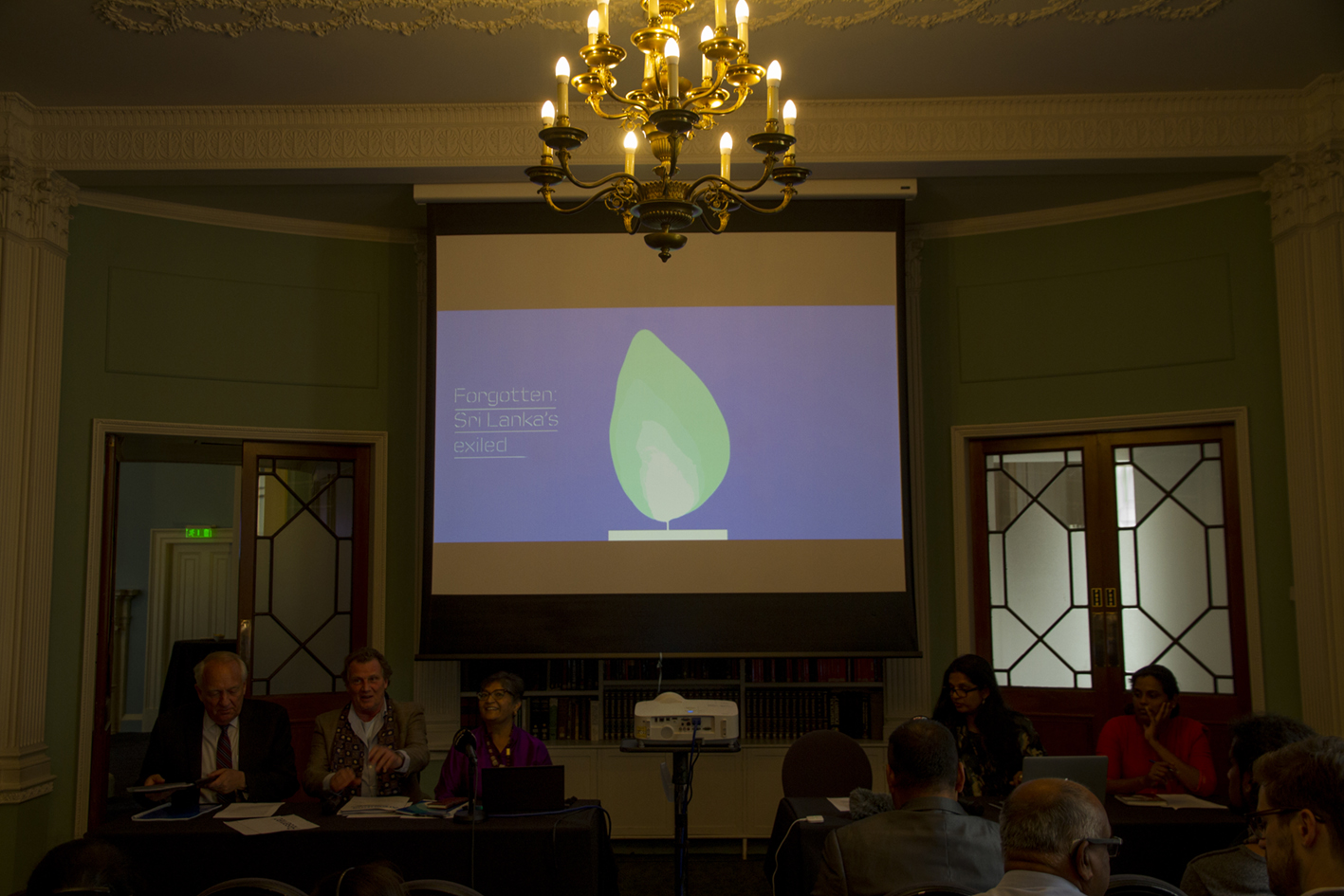by Tamil Guardian, London, June 12, 2016
Tough supportive pressure is needed for genuine accountability amid allegations of genocide in Sri Lanka, said former US Ambassador at Large for War Crimes, Crimes Against Humanity and Genocide.
Mr Rapp spoke on a panel in the Royal Institute of Great Britain at the launch of the International Truth and Justice Project (ITJP) report ‘Forgotten: Sri Lanka’s exiled victims,’ which included the author of the report and UN expert Yasmin Sooka, director North-East civil society organisation The Social Architects Sherine Xavier and human rights activist from the North-East Sureca Nava.
 |
Highlighting Sri Lanka’s reneging on its United Nations Human Rights Council commitments, Mr Rapp noted a lack of confidence emerging in Sri Lanka’s commitment genuine accountability and implementation of United Nations Human Rights Council Resolution (UNHRC).
“We are going to have zero tolerance. Pulling back from hybrid court commitment was a real trust breaker. We see this lack of trust and it’s understandable. It begins to look like everything that was promised will be swept away,” he said.
Mr Rapp, who previously led prosecutions on the International Criminal Tribunal on Rwanda, further stressed the needs to normalise the conditions in the North-East adding,
“We have a plan and a timeline. Sri Lanka’s military is way oversized. They don’t even need 10% of land they’ve taken from others.”
Reiterating the need for international pressure to see genuine accountability and reconciliation the former US Ambassador added,
“It is particularly important that this process stays on track and we reach a goal. You are not doing them any favours by not pushing them (Sri Lankan government). A tough but supportive approach from international community is needed.”
Noting the denial of aid to the No Fire Zones during the mass killings in 2009, the former US Ambassador said,
“An extermination of such nature is a crime against humanity,” adding that “You need international law in Sri Lanka’s statue. There are arguments for genocide here.”
Highlighting the huge issue of finding out the truth on numbers of those killed and disappeared Mr Rapp, went on to say that though the UN Panel of Experts report had found 40,000 people dead, the Bishop of Mannar had said at least 100,000 people were missing according to analysis of census records.
Speaking on the findings of the ITJP report Yasmin Sooka outlined the ordeal that many of the victims had gone through before finding safety away from Sri Lanka,
“Many of the Tamil victims have surrendered, ‘rehabilitated,’ but after that you are abducted, tortured, pay a bribe and forced to leave,” she said.
Ms Sooka added that victims have said that militarisation of the North and East must stop, the land must be returned at the Prevention for Terrorism Act must be repealed.”
The UN expert noted that there had been “ a failure of the new regime to establish conducive and inclusive environment for transitional justice.”
Noting concern at the Sri Lankan prime minister’s rejection of international involvement in the accountability process, she added,
“There appears to be a policy of appeasement of Sri Lanka’s military. President Maithripala constantly say these are our war heroes. In the context of lack of acknowledgement and complete denial. What we don’t have is a policy of transitional justice.”
Ms Sooka further said that no progress on accountability could occur unless, Sri Lanka updated it’s penal code, stressing that “in Sri Lanka you cannot prosecute war crimes, crimes against humanity and of course genocide.”
Ms Sooka added to calls for international pressure, stating,
“It is important for the international community to use their leverage to ensure Sri Lanka implements what they agreed to before their peers.”
Speaking on ongoing violations, Sureka Nava, a human rights activist from the North-East said,
“Militarisation has increased impunity for local crimes,” adding that the military was supporting “alcoholism and violence against women,” whilst also “stealing livelihood opportunities for Tamil Women and demanding sex in order to stop harassment”
Ms Nava added that such a climate meant that “many victims did not want to meet UN officials for fear of reprisals. Some said don’t visit us because of the arrests going on.”
Speaking of her own personal experiences, she said on her way to the United Nation Human Rights Council, she had been stopped by Sri Lankan officials at the airport.
Ms Nava concluded that “there is no political will to take any credible actions. The government has changed but the state structure is the same. There are no change in CID, TID, Police and military.”
Sherine Xavier of The Social Architects, stressed that the same level of harassment and surveillance of human rights defenders before the change in governance had continued, stating,
“During one of our meetings last week in Sri Lanka CID visited us. What happened in 2012 is happening in 2016.”
Commenting on calls to support the current government, she added,
“People say we have no other choice but to support this government. I will not settle for less. As a person of Tamil origin. Sometimes I feel whether we have been betrayed again.”
Commenting on how some of Colombo civil society had relaxed on furthering progress on accountability Ms Xavier said,
“I’m tired of friends telling me government doesn’t have control over military. It’s sad that in Sri Lanka, civil society narrative has changed. The goal was accountability and we used regime change to get towards it. Others used accountability just to get regime change.”
The event ended with a question and answer session with the audience.
Speaking from the floor the chairman of the British Tamil Conservatives questioned how committed Prime Minister Ranil Wickremesinghe and Foreign Minister Mangala Samaraweera were to accountability and reconciliation, given that they had served under previous government that were responsible for atrocities against Tamils.